|
 Cantharellus wellingtonensis Cantharellus wellingtonensis
SynonymsHygrophorus variabilis
BiostatusPresent in region - Indigenous. Endemic
Images (click to enlarge)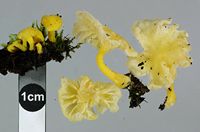
Owner: J.A. Cooper | 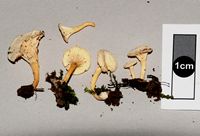
Owner: J.A. Cooper | 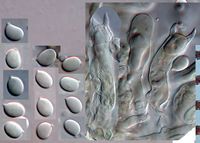
Caption: basidia and spores
Owner: J.A. Cooper | 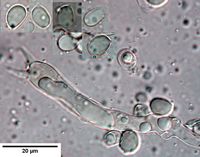
Caption: 2-spored basidium and spores
Owner: J.A. Cooper | 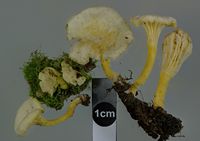
Owner: J.A. Cooper | 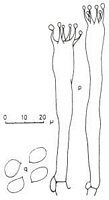
Caption: p, basidia: q, spores | 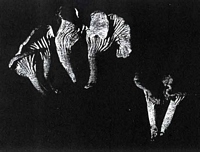 | 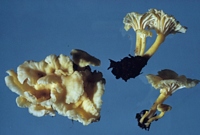
Owner: Herb. PDD | 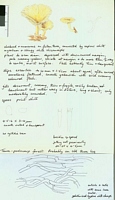
Caption: Watercolour
Owner: G.M. Taylor | 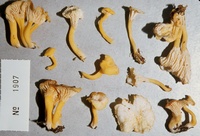
Caption: ZT1907
Owner: E. Horak: © Creative Commons Attribution-Noncommercial 3.0 New Zealand | 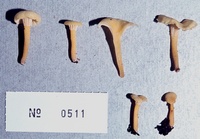
Caption: ZT0511
Owner: E. Horak: © Creative Commons Attribution-Noncommercial 3.0 New Zealand | 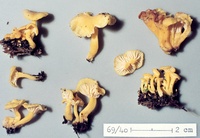
Caption: ZT69-040
Owner: E. Horak: © Creative Commons Attribution-Noncommercial 3.0 New Zealand | 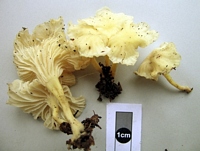
Owner: J.A. Cooper | 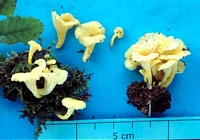
Caption: Hunua Mountains, North Island, 2001-04-25.
Owner: Karl Soop | 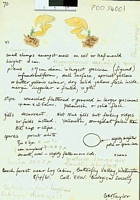
Caption: Watercolour
Owner: G.M. Taylor |  | 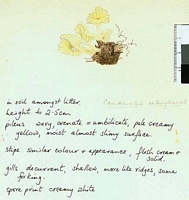
Caption: Watercolour
Owner: G.M. Taylor | 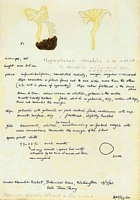
Caption: Watercolour
Owner: G.M. Taylor | 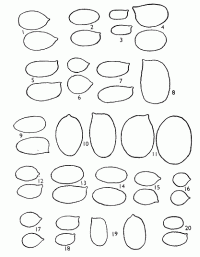
Caption: Spores X 2000 1. Hygrophorus salmonipes 2; H. elsae; 3, H .julietae; 4, H. variabilis; 5, H. lilaceo-lamelllatus; 6, H. muritaiensis; 7, H. keithgeorgei; 8, H. pseudococcineus; 9, H. rubro-carnosus; 10, H. miniceps; 11, H. procerus; 12, H. multic |
Article: McNabb, R.F.R. (1971). Some new and revised taxa of New Zealand Basidiomycetes (Fungi). New Zealand Journal of Botany 9(2): 355-370 (http://www.rsnz.org/publish/abstracts.php).
Description: Pileus 0.3-2.5 cm diam., plano-convex to broadly and deeply infundibuliform, sometimes irregularly infundibuliform, dry, subglabrous to finely felted, pallid yellow; margins involute when young, moderately so at maturity, often irregularly lobed. Cuticle a cutis, composed of repent, slightly interwoven, thin-walled hyphae 5-8 µm diam., often with pallid yellow contents, terminal cells unspecialised, clamp connections present. Lamellae decurrent, moderately distant, to 1.5mm deep, thick, edges obtuse, irregularly forked or anastomosing, pallid yellow. Stipe 0.5-2 cm long, more or less equal, 2-3 mm diam., dry, solid or slightly stuffed at maturity, glabrous to subglabrous, brittle, pallid yellow; flesh pallid yellow, continuous with pileus.
Spores ovate, ovate-elliptical, or obovate, often flattened on one side, hyaline, inamyloid, apiculate, 7.5-11 x 5-7.5 µm, thin-walled, smooth. Hymenium continuous; basidia hyaline, long, flexuous, subclavate, 55-95 x 7.5-11.5 µm. (4)-6-spored, sterigmata to 8 nm long; cystidia absent. Hymenophoral trama without organization, composed of thin-walled, hyaline, clamped hyphae 6-15 µm diam. Context of pileus pallid yellow, thin.
Habitat: Densely gregarious or caespitose under native trees and shrubs.
Distribution: TYPE LOCALITY: Wellington, New Zealand.
Notes: The above description differs from Stevenson's in that spores are inamyloid, and basidia are longer, broader, and (4)-6-sterigmate. There is considerable variation in spore shape in the collections examined, but as this character could not be correlated with other morphological or anatomical characters, it appears to be of little taxonomic significance. The absence of organisation in the hymenophoral trama, and the long, flexuous basidia, indicate that this species belongs in the Cantharellaceae. The specific name cannot be transferred to Cantharellus as the epithet is preoccupied by C. variabilis Quel. 1882 (fide Corner, 1966). Similarly, the practice of naming the species after the author cannot be followed because of the existence of C. stevensonii Berk. & Br. 1875.
Cantharellus wellingtonensis is relatively common in native scrub and forest, often forming patches several square feet in extent. The species readily fits within subgenus Cantharellus sect. Cantharellus as defined by Corner (1966).
Article: Horak, E. (1990). Monograph of the New Zealand Hygrophoraceae (Agaricales). New Zealand Journal of Botany 28(3): 255-306 (http://www.rsnz.org/publish/abstracts.php).
Notes: H. variabilis Stevenson, Kew Bull. 16: 377 ( 1962),
= Cantharellus wellingtonensis McNabb, N.Z.Journ.Bot. 9: 361 (1971).
Article: Stevenson, G. (1963) [1962]. The Agaricales of New Zealand: IV. Kew Bulletin 16(3): 373–384.
Description: Pileus 0.3-1.5 cm,
diam., pale luteous, planoconvex to broadly infundibuliform, matt; flesh pale luteous. Gills decurrent,
pale luteous, thick, moderately distant, irregularly forked. Stipe up to 2 X
0-3 cm., pale luteous, solid, continuous with cap,
brittle, matt. Spores 7-8 X 9-10 µm., ovoid, thin-walled,
hyaline, amyloid. Basidia 60 X 5-6 µm, four-spored.
Habitat: habitat :
dense groups of all sizes rooting in bare clay or on mossy banks, Wellington
Botanic Garden, 2.5.1947 & 12.8.1956;
Whangamoa, 9.5.1956; Catchpole, 3.5.1958; all Stevenson.
Article: Horak, E. (1971). A contribution towards the revision of the Agaricales (Fungi) from New Zealand. New Zealand Journal of Botany 9(3): 403-462 (http://www.rsnz.org/publish/abstracts.php).
Notes: Hygrophorus variabilis Stevenson (28 D) = Cantharellus sp.
|